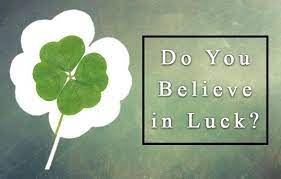If you believe in luck, you are hardly alone. As a matter of fact over 90% of the US population believes in luck. This is interesting because over 60% of our population believes strongly in God. Generally speaking, most people that believe in a higher being of creation also believe that God’s “will” plays a significant part in what happens in our daily lives, and our human lives in general.
It’s hard to say exactly where the theory of luck came from, because mathematically we can demonstrate the reality of probability. Most people are aware of the fact that Blackjack, poker and other casino games use probability to come to a conclusion about the remaining cards.
When it comes to the Togel Singapore, there is a completely different system of probabilities. Luck does play a role in the probability of winning the lotto jackpot, but not in the probability of other winning lotto prizes. People that believe in luck are often quite poor lottery players. They play a lot of different combinations of numbers, and the more varied the numbers are, the less likely they are to come up and win. If you believe in a higher being of creation, and he has favored you (so he must be good), you would likewise decrease your chances of winning the lotto. The only real advice you can give yourself about improving your chances of winning the lotto is to become more aware of what principles of probability theory are involved, and how they apply to the lotto system.
There is a whole body of research dedicated to the bettering our understanding of certain lottery strategies, and the development of methods for improving our ability to choose more efficiently and attentively. One of the most fundamental failures in our modern-day culture is the grounding of our hope in technology, and the increasing separation of our common human society into an elite and an aristocracy, drawing downward instead of upward. Everything in our society seems to be moving more and more away from the social compact and towards a self-enclosed elite. Knowing how to improve your chances of winning the lotto would therefore be more of a long-term, and not a short-term, problem. However, because of the short-term element of our modern-day dilemma, many people areency instead of optimists.
In contrast to everything we have just said, there is a whole body of research going on today to try to better the odds of people winning the lotto. A very good example is the tv DP interactive game. This game provides information consumers with the possibility to predict the numbers that shows in the winning combination. This is a interactive game which provides pleasure and entertainment according to the express premise that all people have the same chance of winning in the lotto. Also,DP sets the players the chance to gain money for those who succeed in predicting the correct number. The television game also shows different live draws happening simultaneously with the game. All of these different parts of the game help making the television game more interactive and exciting for its viewers.
Therefore, knowing how to predict the lotto can be a very worthwhile prize. We should all be proud that we are part of a society that valued its human beings enough to protect them from causes that are mainly avoidable. Unfortunately, the vogue in our times is one that valued more things for the moment of leisure than those that added long-term benefits.
